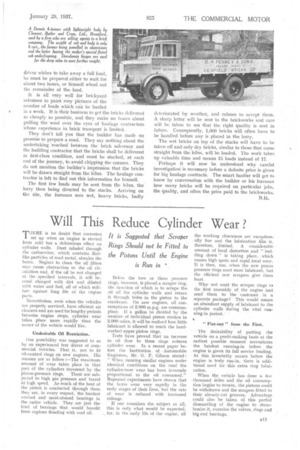Will This
Page 45

If you've noticed an error in this article please click here to report it so we can fix it.
Reduce Cylinder Wear ?
THERE is no doubt that corrosion I set up when an 'engine is started from cold has a deleterious effect on cylinder walls. Dust inhaled through the carburetter, which contains flintlike particles of road metal, abrades the bores. Neglect to clean the oil filters may cause obstruction to the oil circulation and, if the oil be not changed at the specified intervals, it will become charged with dirt and diluted with water and fuel, all of which militate against long life of the engine parts.
Nevertheless, even when the vehicles are properly serviced, have efficient air cleaners and are used for lengthy periods between engine stops, cylinder Wear takes place more rapidly than the owner of the vehicle would like.
Undesirable Oil Restriction.
One possibility was suggested to us by an experienced test driver of commercial vehicles. That is, not to fit oil-control rings on new engines. His reasons are as follow :—The maximum amount of wear takes place in that part of the cylinders traversed by the piston-pressure rings. These are subjected to high gas pressure and travel at high speed. As much of the heat of the piston is conducted through them they arc, in every respect, the hardest worked and most-abused bearings in the entire vehicle. They are just the kind of bearings that would benefit from copious flooding with cool oil. Below the two or three pressure rings, however, is placed a scraperring, the function of which is to scrape the oil off the cylinder walls and return it through holes in the piston to the crankcase. On new engines, oil consumptions of-2,000 m.p.g. are commonplace. If a gallon be divided by the number of individnal piston strol5es in 2,000 miles, it will be realized how little lubricant is allowed to .reach the hardworked upper piston rings.
Tests have proved that an increase in . oil flow to these rings reduces cylinder wear. In a recent paper before the Institution of Automobile Engineers, Mr. G. F. Gibson stated : "When running similar engines under identical conditions on the road the cylinder-bore 'wear has been inversely proportional to the oil consumed." Repeated experiments have shown that the bores wear very rapidly in the early stages of their lives, but the rate of wear is reduced with increased mileage.
If one considers the subject at all, this is only what would be expected, for, in the early life of the engine, all the working clearances are exceptionally fine and the lubrication film is, therefore, limited. A considerable amount of local distortion and "bedding down " is taking place. which causes high spots and rapid local wear. It is then, too, when the new piston pressure rings need most lubricant, but the efficient new scrapers give them least.
. Why not omit the scraper rings in the first assembly of the engine and send' them to the customer in a separate package? This would assure an abundant supply of lubricant to the cylinder walls during the vital running-in period,' • " Flat-out " from the First.
• The desirability Of putting the vehicle on a profit-making basis at the earliest possible moment necessitates the briefest running-in before the _engine is given its full service loading. As this invariably occurs before the engine is truly -run-in, there is additional need for , this extra ring lubrication.
When the vehicle has done a few thousand nule,3 and the oil consumption begins to mount, the pistons could be withdrawn and the scrapers fitted to their already-cut grooves. Advantage could also be taken of this partial dismantling of the engine to decarbonize it, examine the valves, rings and big endbearings.




















































































